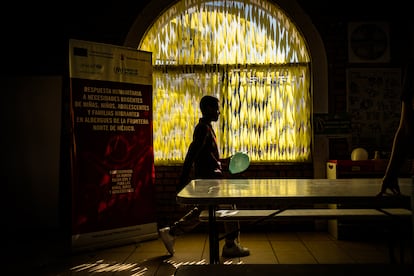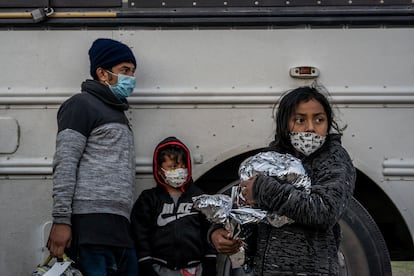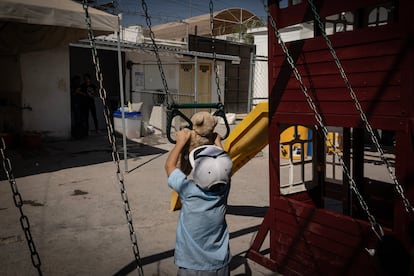Trump extends anti-immigrant crusade to children: Government withdraws legal aid for unaccompanied minors
Thousands of children, some as young as two, will have to navigate an intricate court system alone after a federally funded program was halted on Tuesday


One month after Donald Trump’s return to the White House, the government has approved a measure that falls under two of its priorities: cutting government spending and boosting its anti-immigrant crusade. This time, the victims are the undocumented children who arrive at the border alone. Organizations dedicated to their defense received a stop-work order on Tuesday because the government is halting a federally funded program. With this, children who entered the United States without an adult are now left alone to defend their asylum cases in a complex judicial system that also operates in a language that most do not understand.
“The administration’s decision to suspend this program undermines due process, disproportionately impacts vulnerable children, and puts children who have already experienced severe trauma at risk for further harm or exploitation,” Shaina Aber, executive director of the Acacia Center for Justice, warned in a statement. Her organization provides legal representation to more than 26,000 children in the custody of the Office of Refugee Resettlement (ORR). The stop-work order came in an email from the Interior Department, which also said that the cancellation of the program is due to “causes outside of your control” and should not be interpreted as a judgment of poor performance.
In addition to offering advocacy services and supervising other subcontracted organizations, Acacia trains older children to know their rights and helps them with interpreters, since most do not speak English. Some, like the indigenous children arriving from Guatemala, speak Spanish as a second language.
Bilal Askaryar, a spokesperson for this organization, spoke with El PAÍS over the phone and illustrated the situation with the case of a two-year-old child who is currently represented by a lawyer from the network. “The Administration expects a two-year-old to go to court alone, answer the judge’s questions and defend himself. These are children that need a booster seat so they can sit comfortably in a court chair, and now the Government wants them to present their complicated asylum case before a judge by themselves,” he says.
The government has halted the Unaccompanied Children Program, which means that aid groups will no longer be able to count on the $200 million that the Administration provided annually. It is one more adjustment of the government budget, an objective of Trump and the head of the Department of Government Efficiency (DOGE), Elon Musk.
It is unclear whether lawyers who already have cases assigned to them will be able to continue representing their clients, but without public funding, it will be difficult. “Lawyers are faced with the dilemma of violating ethical obligations and abandoning their clients, or continuing to represent these children for free,” Askayar said.

Asylum applications can take decades. When they cross the border by themselves, minors are met by agents who transfer them to the ORR, which is part of the Department of Health and Human Services (HSS). The minors remain in the custody of U.S. authorities before being transferred to a sponsor, usually relatives, who reside in the country and can take care of them.
“This is an unprecedented attack on immigrant children. These services are critical not only as a matter of fundamental fairness –children should not be asked to stand up in court alone against a trained government attorney –but also for protecting children from trafficking, abuse, and exploitation and for helping immigration courts run more efficiently,” said Roxana Avila-Cimpeanu, deputy director of the Florence Project, which also provides legal services to minors, in a statement.
In the past, most unaccompanied minors were Mexican, but in recent years Guatemala has taken the lead, accounting for 32% of the total. Honduras and Mexico account for 20% each.
The Latino advocacy organization Voto Latino also reacted to Trump’s new directive. In a statement, it denounced that taking away legal assistance from children (some of whom cannot even articulate their own defense) is a violation of basic human rights. “The continued efforts of this Administration to weaken due process for immigrants only serve to make an already vulnerable population even more susceptible to injustice,” said the group, urging Congress to act to restore this right.
Offensive against relatives
According to the most recent HHS statistics, as of January 3, there were 6,292 unaccompanied children in one of the 240 ORR shelters spread across 27 states. The average length of stay is 30 days before they are taken in by a family member or sponsor. In fiscal year 2024 (through October 1), 99,419 children were placed under sponsorship.
From now on, however, relatives will want to think twice before coming forward as sponsors because they risk being detained. The Trump administration will require that relatives who take in an unaccompanied minor and all adult members of the receiving household be fingerprinted. HHS justifies the measure as a mechanism “to improve the security of disclosures to sponsors, prevent fraud, and combat trafficking.”

Child advocates, however, fear the government will use it to detain and deport some of the families who are in the country illegally ― another strategy to fulfill a promise to expel the estimated 13 million undocumented immigrants living in the country.
Immigration and Customs Enforcement (ICE) will also be able to access databases of minors, according to NPR. An ICE spokesperson told the public broadcaster that some of its agents already had access to the databases. “ICE juvenile coordinators, who are trained in laws and regulations related to unaccompanied alien children, have always had access to the ORR juvenile database,” he said, although NPR maintains that more agents are now able to access the information.
Access to minors' data and the immigration status of their sponsors, as well as fingerprinting, are measures that were already implemented during Trump's first term and were canceled by the Joe Biden administration. Critics argued that the new policy would increase the number of children remaining in federal custody, increase detention costs and extend family separation.
According to the Congressional Research Service, a nonpartisan research institute operating within the Library of Congress, after that policy was put in place in Trump’s first term, ICE began arresting undocumented adults who approached them to sponsor children. From July to November 2018, ICE arrested 170 potential sponsors, 109 of whom had no prior criminal records, and placed them in deportation proceedings.
Sign up for our weekly newsletter to get more English-language news coverage from EL PAÍS USA Edition
Tu suscripción se está usando en otro dispositivo
¿Quieres añadir otro usuario a tu suscripción?
Si continúas leyendo en este dispositivo, no se podrá leer en el otro.
FlechaTu suscripción se está usando en otro dispositivo y solo puedes acceder a EL PAÍS desde un dispositivo a la vez.
Si quieres compartir tu cuenta, cambia tu suscripción a la modalidad Premium, así podrás añadir otro usuario. Cada uno accederá con su propia cuenta de email, lo que os permitirá personalizar vuestra experiencia en EL PAÍS.
¿Tienes una suscripción de empresa? Accede aquí para contratar más cuentas.
En el caso de no saber quién está usando tu cuenta, te recomendamos cambiar tu contraseña aquí.
Si decides continuar compartiendo tu cuenta, este mensaje se mostrará en tu dispositivo y en el de la otra persona que está usando tu cuenta de forma indefinida, afectando a tu experiencia de lectura. Puedes consultar aquí los términos y condiciones de la suscripción digital.








































